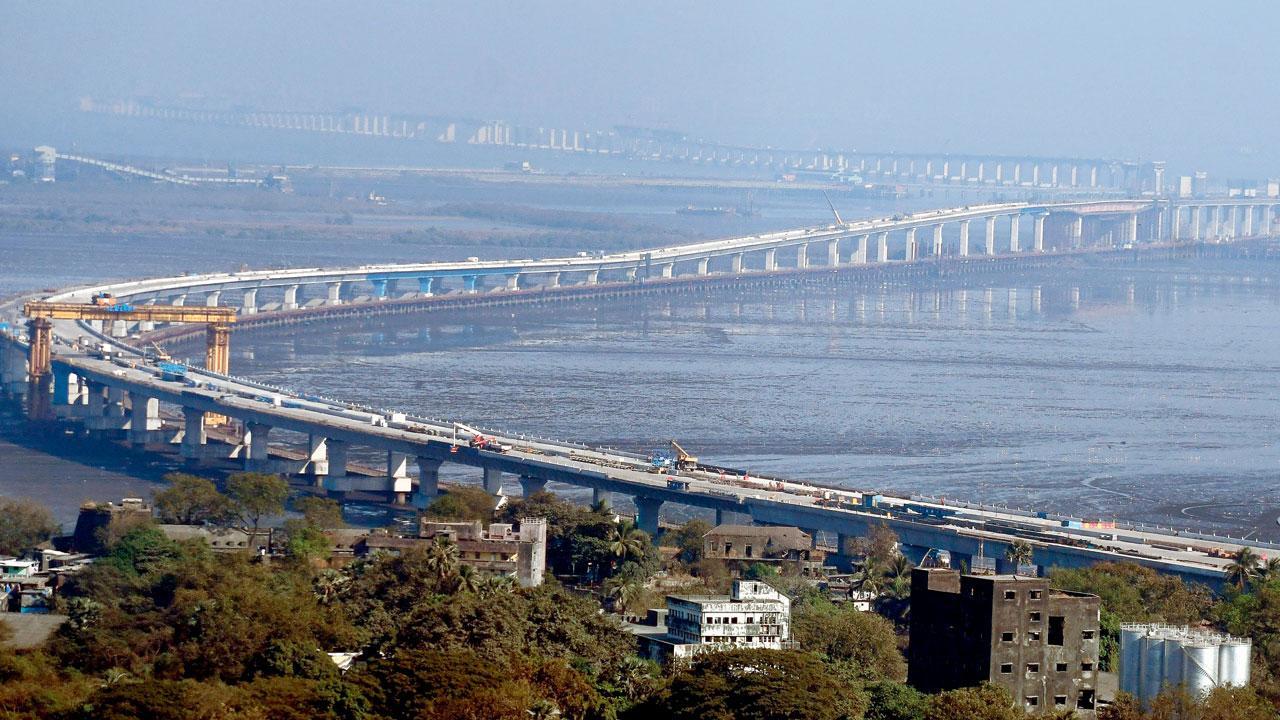
While the state government has decided on a one-way toll of Rs 250 for using the Mumbai Trans Harbour Link (MTHL) connecting Sewri with Nhava Sheva—set to open on January 12—motorists, campaigners, and some political parties believe the toll charges are excessive. On January 4, the Maharashtra Cabinet approved a plan to impose a toll of Rs 250 for a one-way car ride on the MTHL which will be India’s longest sea bridge. Prime Minister Narendra Modi will officially open the much-awaited 21.8-km-long bridge on January 12.
Earlier, the Mumbai Metropolitan Region Development Authority (MMRDA) had planned to charge a toll of Rs 500 for a single trip, but the urban development department (UDD) reduced it to Rs 350 per car. After much debate, the state Cabinet decided on a toll fee of Rs 250 for a single trip. Shiv Sena (UBT) leader and MLA, Aaditya Thackeray was among those who criticised the government for charging toll on the MTHL. On January 4, he posted on X, “Challenge to the illegal CM: After sending away the employment-creation industries to the neighbouring favourite state, at least keep the MTHL toll-free.
Today the Cabinet might take a decision on toll for MTHL. Why is it that Maharashtra pays… pays taxes, pays tolls, pays for their dirty politics… and their favourite state, our neighbour, is forced to accept the industries and investment even when it isn’t ready for it? Btw, has the MTHL, Digha Railway Station and Uran Line inauguration date been formally announced yet?”After the state government announced the toll rates for the MTHL on Thursday, many people took to Twitter and even criticised the government.
When questioned about whether the toll of Rs 250 per trip on MTHL and associated rebates provided were appropriate, Sudhir Badami, transport expert and member of MMRDA’s toll rate committee, said, “I consider the toll of Rs 250 per trip on the MTHL and associated rebates provided totally inappropriate. The government should have provided a fleet of 35 AC buses, with each having a capacity to seat 20 passengers. Of these, 15 should be started immediately, finally operating every 75 seconds at an average speed of 90 kmph, providing a capacity of about 1,000 persons per hour at a capital cost of about Rs 10 crore, merged with the project cost, and the operating cost included in the repayment scheduled cash flow. Charge appropriate fare for this public transport from commuters and charge no toll to these or any other public transport vehicle with a capacity of 10 or more. While doing this, charge a R500 toll fee for any passenger vehicle with a seating capacity of nine or less, with no rebate for multiple use. This can be done even now if the Cabinet is provided the number of beneficiaries of bus commuters as against motorcar beneficiaries.”
Meanwhile, transport expert Jitendra Gupta said a lot depends on the MTHL’s per-hour carrying capacity. “If it is found underutilised due to high toll rate, then definitely it becomes a national loss as the very purpose of building the bridge fails as such underutilisation would reduce the foreign exchange savings on the fuel saved as well as time saved for boosting the economy. But in any case, public transport as well as taxis, autos and goods transport, need to be kept toll-free so that it remains within the affordable limit for the common man. Also, daily passes could bring down toll costs for private use,” Gupta said. According to RTI activist Anil Galgali, this is the first time that the MMRDA is charging a toll on one of its projects.
“I personally feel that there should be no toll for the MTHL which is an important project. If we calculate the per kilometre toll on the MTHL it comes to Rs 11.46. If we take into consideration the per kilometre toll on the Samruddhi highway, it comes to a minimum of Rs 1.73 and a maximum of Rs 6.38 per km. The minimum per kilometre toll on the Mumbai-Pune Expressway is Rs 3.36 and the maximum is Rs 22.78 per km. Charging such a high price to save fuel and time would be extorting from citizens. If it couldn`t be done for free, a price of Rs 70 would have been widely accepted by people.”
The 21.8-km-long, six-lane bridge has three interchanges—at Sewri in south Mumbai (connecting MTHL to the Eastern Freeway on the Mumbai Side); at Shivaji Nagar in Ulwe (connecting MTHL to Navi Mumbai Coastal Road; and at the Chirle interchange). One of the key advantages of the MTHL project is its ability to provide faster connectivity to various important locations, including the proposed Navi Mumbai International Airport, JNPT Port, Mumbai-Pune Expressway and the Mumbai-Goa Highway. This improved accessibility will not only enhance transportation but also contribute to the overall growth and prosperity of the region.
Rs 250
Toll amount fixed for one-way trip on MTHL
#Mumbai #citizens #transport #experts #MTHL #toll #high